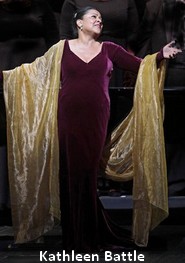
ReviewsVAF: Kathleen Battle
Behind her were the 53-voice Norfolk State University Choir, directed by Dr. Carl Haywood. Seated at the piano was Joel L. Martin, the accompanist—which doesn’t begin to describe what and how he played. Patricia Saunders Nixon and Gregory Garner, both of whom are excellent singers, were the inspiring and dramatic narrators who read letters and quotes from such seminal figures as Frederick Douglass, Harriet Tubman and Dr. Martin Luther King. The program, a concert of spirituals, was called Underground Railroad: A Spiritual Journey. Battle and the choir began without accompaniment; she intoned Lord, How Come Me Here? with soaring ease over the choir’s wordless humming, which was quiet, effective and seamless. Battle’s last note seemed to spin out forever. Choir and pianist Martin joined Battle in an interesting arrangement of Go Down, Moses, in which she displayed both power and finesse in gorgeous ornamentation. Roll Jordan Roll had an energetic and very jazzy keyboard arrangement, with big arpeggios to the final note. Battle and Martin brought out all the confident hope of A City Called Heaven. Martin soloed on Soon Ah Will Be Done-a Wid De Troubles—with powerful chords and shifting dynamics, leaning back, with one foot beating time. In Hush, Hush, Somebody’s Calling My Name, Battle began a cappella and then the piano came in. She would put her hand up to subtly direct the accompanist, and pull apart a note—there’s no other way to describe it—and flash that dazzling smile afterwards. Over My Head (I Hear Music Everywhere) began with Battle’s a cappella solo; the beautifully trained chorus was spellbinding. Battle told of the trailblazing African American tenor and composer Roland Hayes, and sang his Two Wings a cappella. In the familiar “Wade in the Water,” three soloists from the choir drew knowledgeable applause, and Battle soared up to a high, high, high note to end on. The singers and accompanist came together in a nice arrangement of Swing Low, Sweet Chariot. Ride Up in the Chariot had a rolling, driving piano solo, the women and men of the chorus, and Battle’s pristine soprano. Battle sang Calvary with crystal clarity sans accompaniment. The choir’s impressive dynamics came through in Hold On. An odd but interesting arrangement began Gospel Train, with the women of the choir backing Battle’s “Get on board, little children.” The choir had power and conviction in I Don’t Feel No Way Tired, which segued into a more modern, dramatic Farther Along. Glory, Glory Hallelujah! got the full treatment—male and female soloists from the choir, brilliant piano, and, of course, Battle’s incomparable sound. Battle led Fix Me, Jesus in a great choral arrangement by Jacqueline Hairston. A sextet of women from the choir lined up, three on either side of Battle, for Balm in Gilead all of them spinning that last note out, ever more softly—simply wonderful. After Let Us Break Bread Together, Battle, Martin and the choir sang Ain’t Gonna Let Nobody Turn Me Roun’. The men began, with declarative melody; then the women added harmony. Battle brought out the humor of the verses and Martin’s piano riffs were, well, amazing. Haywood directed the audience in James Weldon Johnson’s Lift Every Voice and Sing, and they responded with gusto. Battle’s encores included Were You There—a cappella, with stunning simplicity. Martin joined her for Every Time I Hear the Spirit. For the final encore, she spoke softly to the choir and told the audience, “We didn’t have time to rehearse this but once.” It was an a cappella arrangement of the traditional Little David—she soloed, the choir came in, they sang and sang. . . and when they finished, Battle hit a piano chord. After a long a cappella song, the singers were in tune! (Folks, that’s really hard to do.) The NSU soprano soloists were Layla Dixon, Starlet Wickham, with altos Tremaya Hill and Charmane Wynn. The sextet of women singers included Dixon and Wickham, Terri Douglas, Anya Simmons, Nicole Houston and Latoya Atkinson. The tenor soloists were Gerell Traynum and Geramiah Gardner, and bass Jonathan Holmes. The use of a cappella singing, both in Battle’s solos and in the choir, was challenging—and extraordinary. Sometimes in gospel music, the ornamentation overwhelms both the melody and the text. Battle’s approach had everything in balance, superb ornamentation with no loss of melody, just utterly and beautifully simple. That’s not easy—but she certainly made it look effortless. This review was originally broadcast on WHRO 90.3 FM’s “From the other side of the Footlights.” |
 When renowned soprano Kathleen Battle walked onto the stage at the Wilder Center March 26 to begin the Virginia Arts Festival 2017 season, the crowd roared its approval before she sang a note. With her hair pulled back in a classic French twist, wearing a long-sleeved, floor-length burgundy velvet dress and a gold organza stole that also reached the floor, Battle took command of the stage in the way only an experienced diva can.
When renowned soprano Kathleen Battle walked onto the stage at the Wilder Center March 26 to begin the Virginia Arts Festival 2017 season, the crowd roared its approval before she sang a note. With her hair pulled back in a classic French twist, wearing a long-sleeved, floor-length burgundy velvet dress and a gold organza stole that also reached the floor, Battle took command of the stage in the way only an experienced diva can.